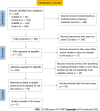Immune checkpoint inhibitors in head and neck squamous cell carcinoma: A systematic review of phase-3 clinical trials
- PMID: 35662989
- PMCID: PMC9153072
- DOI: 10.5306/wjco.v13.i5.388
Immune checkpoint inhibitors in head and neck squamous cell carcinoma: A systematic review of phase-3 clinical trials
Abstract
Background: The outcomes of patients diagnosed with head and neck squamous cell carcinoma (HNSCC) who are not candidates for local salvage therapy and of those diagnosed with recurrent or metastatic disease are dismal. A relatively new systemic therapy option that emerged in recent years in the treatment of advanced HNSCC is immunotherapy using immune checkpoint inhibitors (ICIs). The safety profile and anti-tumor activity of these agents demonstrated in early phase clinical trials paved the way to the initiation of several promising phase-3 trials in the field.
Aim: To evaluate the evidence on the effectiveness of ICIs in HNSCC, based on published phase-3 clinical trials.
Methods: We searched PubMed, Cochrane Library, Embase, and Scopus to identify published literature evaluating immunotherapy using ICIs in recurrent or metastatic HNSCC (R/M HNSCC) and locally advanced head and neck squamous cell carcinoma (LAHNSCC). We used a combination of standardized search terms and keywords including head and neck squamous cell carcinoma, recurrent, metastatic, locally advanced, immunotherapy, immune checkpoint inhibitors, monoclonal antibodies, programmed cell death protein-1 (PD-1), programmed death-ligand 1 (PD-L1), cytotoxic T- lymphocyte associated protein-4 (CTLA-4), and phase-3 clinical trial. A sensitive search filter was used to limit our results to randomized controlled trials.
Results: Five phase-3 clinical trials have reported the data on the effectiveness of immunotherapy in HNSCC so far: Four in R/M HNSCC and one in LAHNSCC. In patients with R/M HNSCC, anti-PD-1 agents nivolumab and pembrolizumab demonstrated improved survival benefits in the second-line treatment setting compared to the standard of care (standard single-agent systemic therapy). While the net gain in overall survival (OS) with nivolumab was 2.4 mo [hazard ratio (HR) = 0.69, P = 0.01], that with pembrolizumab was 1.5 mo (HR = 0.80 nominal P = 0.0161). The anti-PD-L1 agent durvalumab with or without the anti-cytotoxic T- lymphocyte associated protein-4 agent tremelimumab did not result in any beneficial outcomes. In the first-line setting, in R/M HNSCC, pembrolizumab plus platinum-based chemotherapy resulted in significant improvement in survival with a net gain in OS of 2.3 mo (HR = 0.77, P = 0.0034) in the overall population and a net gain in OS of 4.2 mo in the PD-L1 positive (combined positive score > 20) population compared to standard of care (EXTREME regime). In patients with PD-L1 positive R/M HNSCC, monotherapy with pembrolizumab also demonstrated statistically significant improvement in survival compared to EXTREME. In LAHNSCC, immunotherapy using avelumab (an anti-PD-L1 agent) along with standard chemoradiation therapy did not result in improved outcomes compared to placebo plus chemoradiation therapy.
Conclusion: Anti-PD-1 agents provide survival benefits in R/M HNSCC in the first and second-line settings, with acceptable toxicity profiles compared to standard therapy. There is no proven efficacy in the curative setting to date.
Keywords: Head and neck squamous cell carcinoma; Immune checkpoint inhibitors; Immunotherapy; Locally advanced head and neck squamous cell carcinoma; Monoclonal antibody; Recurrent/metastatic head and neck squamous cell carcinoma.
©The Author(s) 2022. Published by Baishideng Publishing Group Inc. All rights reserved.
Conflict of interest statement
Conflict-of-interest statement: Authors have nothing to disclose.
Figures
References
-
- Gupta B, Johnson NW, Kumar N. Global Epidemiology of Head and Neck Cancers: A Continuing Challenge. Oncology. 2016;91:13–23. - PubMed
-
- Bray F, Ferlay J, Soerjomataram I, Siegel RL, Torre LA, Jemal A. Global cancer statistics 2018: GLOBOCAN estimates of incidence and mortality worldwide for 36 cancers in 185 countries. CA Cancer J Clin. 2018;68:394–424. - PubMed
-
- Marur S, Forastiere AA. Head and Neck Squamous Cell Carcinoma: Update on Epidemiology, Diagnosis, and Treatment. Mayo Clin Proc. 2016;91:386–396. - PubMed
LinkOut - more resources
Full Text Sources
Research Materials


